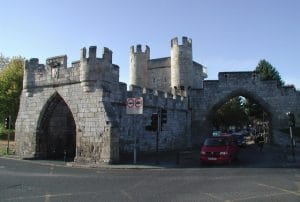 On this day in 1541, King Henry VIII entered the city of York through Walmgate Bar, and was met by the city’s officials at Fulford Cross.
On this day in 1541, King Henry VIII entered the city of York through Walmgate Bar, and was met by the city’s officials at Fulford Cross.
The mayor and the aldermen of the city then begged forgiveness from the King for the North’s rebellion during the Pilgrimage of Grace, and gave the King and his wife, Queen Catherine Howard, a gold cup each full of gold coins.
Henry VIII’s 1541 progress to the North was not only the King’s way of emphasising his power over the North, but was also a diplomatic journey, with the King planning to meet the Scottish king, James V, at York. Henry VIII spent nine days in York waiting for James, but unfortunately he was stood up.
Taken from On This in Tudor History by Claire Ridgway.
Picture: Walmgate Bar, York, © Copyright Paul Glazzard and licensed for reuse under this Creative Commons Licence, Geograph UK – http://www.geograph.org.uk/photo/608475